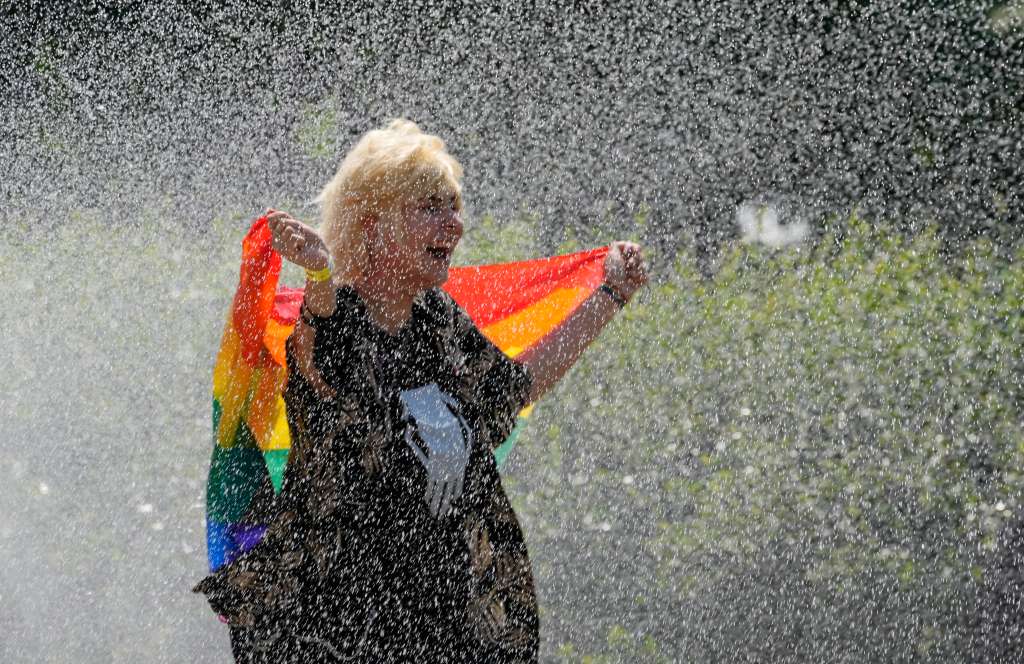WARSAW, Poland (AP) — The largest gay pride parade in central Europe took place again in Warsaw for the first time in two years after a pandemic-induced break — and amid a backlash in Poland and Hungary against LGBT rights.
Warsaw Mayor Rafal Trzaskowski walked at the head of the Equality Parade on Saturday — a sign of support for LGBT rights by the liberal politician. Thousands of people joined the march and were cheered on by others waving rainbow flags from their apartment balconies.
But that level of acceptance is not universal in Poland, a heavily Catholic, largely conservative nation.
The joyful and colorful celebration was tinged with fear of what the future holds for the rights of gay men, lesbians, bisexuals and transgender people after setbacks first in Russia and now in Hungary.
“The day of the parade is always a bitter-sweet moment for our community,” said Rafal Wojtczak, a spokesman for the organizers. He described feelings of sadness and helplessness that LGBT people have not achieved rights liked same-sex partnership or marriage in Poland, while also facing new threats.
The parade comes days after Hungary’s parliament passed a law that makes it illegal to show any materials about LGBT issues to people under 18.
Hungary’s conservative ruling party portrayed the law as an effort to fight pedophilia. But human rights groups see it as a cynical tool that will stigmatize and discriminate against LGBT people, and prevent youth from accessing critical information.
Poland’s populist ruling party has taken a political direction very similar to that of Hungary under Prime Minister Viktor Orban in past years, pushing conservative policies and tightening ruling party control over courts and media. The European Union has denounced both these two member nations, accusing them of eroding democratic norms.
One prominent Polish activist, Bart Staszewski, carried a Hungarian flag in Saturday’s march. He said it was a message to the EU to act in defense of LGBT people because he fears that “Poland will be next.”
A year ago, the Polish LGBT community faced a backlash from ruling conservative politicians, local communities and the church. In his successful bid for reelection against a challenge from Trzaskowski, President Andrzej Duda declared that “LGBT is not people; it’s an ideology” while also claiming that it was “even more destructive” than communism.
A Polish archbishop warned of a “rainbow plague.” And dozens of local communities in Poland were passing resolutions against “LGBT ideology” in what was described as an attempt to protect the traditional family. These were strongly denounced by EU officials and a handful have since been rescinded.
“We’ve been through a very, very rough time, but at the same time we are going out in the streets and we are saying we are stronger and we are not going to give up,” said Miroslawa Makuchowska, vice director of Campaign Against Homophobia.
Wojtczak said “our community has been used in a political war.”
At the start of the march, some people chanted a vulgarity against Poland’s ruling party.
This weekend’s Equality Parade comes 20 years since the event was first held in the Polish capital. It was banned twice in its early years by a conservative mayor, Lech Kaczynski, who feared it would promote homosexuality, and last year it was canceled due to the coronavirus pandemic.
Since the first event in 2001, Polish society has become largely more open on the issue of gay rights, shaped by EU membership and cultural influences from the West.
This year’s parade was smaller than the one in 2019 due to some pandemic restrictions.
(Copyright (c) 2024 The Associated Press. All Rights Reserved. This material may not be published, broadcast, rewritten, or redistributed.)

